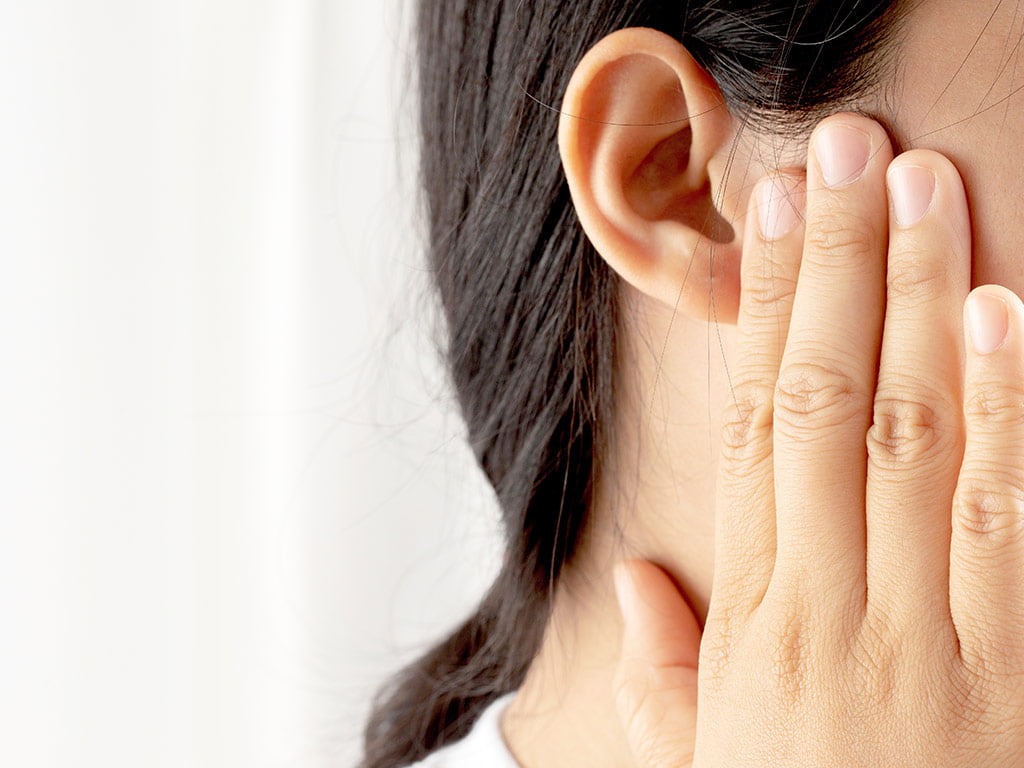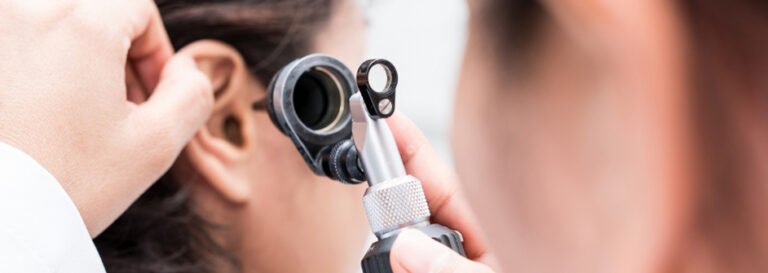Having muffled hearing can be confusing and frustrating, especially if it has no obvious reason. It may feel like there’s a barrier between you and the world around you, making it difficult to understand conversations or hear the TV clearly, for example. This can affect your day-to-day life in many ways.
A change in your hearing can have several causes, ranging from minor issues like earwax buildup to more serious conditions that may require medical attention. Read on to find out what the most common causes are, what symptoms to watch out for, and how to get the right help when you need it.
In This Article:
Common Symptoms You May Get Alongside Muffled Hearing
A decrease in hearing doesn’t usually occur in isolation – it often comes alongside other symptoms that can help determine its root cause. Some of them include:
- Feeling of discomfort or pain in one or both ears
- Irritation or itching in the ear canal
- Strong or unusual smell coming from the ear
- Any kind of fluid or discharge
- Feeling of pressure or fullness in the ear
- Constant or intermittent ringing/buzzing in the ears (tinnitus)
These symptoms are signs that there may be an underlying issue that needs attention. If you experience one or more of these alongside muffled hearing, make sure to get in touch with your GP for an evaluation.
Potential Causes of Muffled Hearing
Feeling like you can’t hear very well can result from a variety of factors. Some of those you can treat at home, but others require medical attention. Have a look below for some of the common causes:
(1) Impacted Earwax (Cerumen)
Earwax buildup is one of the most common reasons for muffled hearing. Earwax is naturally produced to protect the ear canal, but when it builds up excessively, it can block sound from reaching the eardrum. Attempting to remove wax at home using cotton swabs or other tools can actually push it further down the ear canal, making the issue worse instead of resolving it. If you think you might be suffering from earwax impaction, make sure to look for professional help from an audiologist or a hearing care provider.
(2) Sinusitis (Sinus Infection)
Sinus infections can also contribute to muffled hearing by causing ear congestion. When the sinuses become inflamed, fluid may build up and affect the Eustachian tube, leading to a feeling of fullness or blocked ears. Sinusitis often presents with additional symptoms such as headaches, a cough, and fatigue. If sinus symptoms persist for more than 10 days, seek medical assistance to help alleviate the infection and the muffled hearing.
(3) Age-Related Hearing Loss (Presbycusis)
As we age, our hearing abilities often decline, especially when it comes to high-pitched sounds. Age-related hearing loss (or presbycusis) is very common among seniors: in the UK, about 40% of people aged 50 years old and 71% of those aged 70 years and above suffer from it. If you are experiencing persistent muffled hearing and you’re over the age of 50, it’s a good idea to schedule a hearing test with a professional to assess your hearing health.

(4) Middle Ear Infection (Otitis Media)
Middle ear infections, or otitis media, occur when fluid builds up due to inflammation of the Eustachian tube. This condition can prevent fluid from draining properly, allowing bacteria and viruses to multiply behind the eardrum. The result is a muffled sensation along with pain, fever, or pressure in the ear. Some middle ear infections clear on their own, but it’s best to seek medical advice to prevent complications.
(5) Ear Barotrauma
Ear barotrauma occurs when there are sudden changes in air pressure, causing discomfort or muffled hearing. Common scenarios include airplane take-offs and landings, elevator rides in tall buildings, or underwater activities such as diving. The pressure changes can lead to discomfort, muffled sounds, and in severe cases, ear pain or vertigo.

(6) Noise-Induced Hearing Loss
Exposure to loud sounds, whether from concerts, loud machinery, or even headphones, can cause damage to the inner ear structures, leading to noise-induced hearing loss. This type of damage can be immediate or develop gradually. Having a hearing test can identify and manage any existing damage to your hearing.
(7) Tinnitus
Tinnitus – a condition described as a constant or intermittent ringing/buzzing in the ears – often accompanies decreased hearing. It can occur as a result of aging, exposure to loud noises, or other health conditions, such as cardiovascular issues. Tinnitus can significantly impact quality of life, making it harder to concentrate or sleep. Fortunately, there are treatment options available to help manage the symptoms and improve daily comfort.
(8) Foreign Objects in the Ear Canal
A foreign object stuck inside your ear canal could be the culprit behind your hearing issues – water, an insect, or a tiny item. While especially common with children, this could happen to anyone. If you’ve got an object stuck in your ear, besides muffled hearing, you’re likely to also experience pain, fluid drainage, or even bleeding. Make sure to seek medical help as soon as possible if this occurs.
(9) Ototoxic Medications
Certain medications, such as some antibiotics, chemotherapy drugs, and diuretics, can have an adverse effect on your hearing. Known as ototoxic medications, they can cause hearing loss or a feeling of muffled hearing as a side effect. Be aware of symptoms like tinnitus, vertigo, or fullness in the ears if you are taking these medications and consult your doctor if you experience any of these.

(10) Other Possible Causes
In rare cases, muffled hearing can happen due to conditions such as Meniere’s disease, tumours like acoustic neuromas, or even head trauma and a ruptured eardrum. These conditions often require prompt medical attention for appropriate diagnosis and treatment.
Muffled Hearing After Earwax Removal
Sometimes, even after earwax has been professionally removed, you might still experience muffled hearing. This can happen with different earwax removal methods, such as syringing, microsuction, or manual removal. There are several potential reasons for it:
- Residual Blockage: Occasionally, earwax removal may not fully clear all the wax from the ear canal, leading to residual blockage. This can leave you feeling that your ear still feels blocked/clogged after wax removal.
- Ear Canal Irritation: Earwax removal procedures can sometimes cause minor irritation or inflammation or the eat canal, which can result in muffled hearing after syringing/microsuction. This is usually temporary and should subside over time.
- Eustachian Tube Disfunction: Another possible reason for muffled hearing after earwax removal is Eustachian tube disfunction. The Eustachian tube helps equalise pressure in the ear, and if it becomes blocked or inflamed, it can lead to a feeling that your ear still feels blocked after wax removal, even though the canal is clear.
Remember, if you experience prolonged hearing loss after microsuction or water irrigation, you need to consult your audiologist or hearing care professional. They can perform further assessments to determine the cause and suggest appropriate treatment, referring you to your GP if appropriate.

When to Seek Medical Help
Muffled hearing may sometimes resolve on its own, especially if it’s occurring due to temporary factors like a cold or slight earwax buildup. However, persistent or recurring decrease in hearing should not be ignored, as it could be a sign of a more serious underlying condition that requires medical attention.
You should consider booking an appointment with your GP or an audiologist if:
- You experience muffled hearing for more than a few days without improvement.
- There is pain, discharge, or bleeding from the ear.
- There is a considerable decline in your hearing ability.
- You experience symptoms like dizziness, vertigo, or persistent ringing in the ears (tinnitus).
Seeking help on time is important for protecting your long-term hearing health. Getting a diagnosis and treatment on time can prevent complications, such as permanent hearing loss or chronic ear infections. If you’re unsure, it’s always best to get your symptoms checked out by a professional.
Tips for Protecting Your Hearing
Here are some actionable tips to help you maintain your hearing health:
(1) Ear Hygiene Best Practices
- Avoid Inserting Objects Into the Ear Canal: Using cotton swabs or other objects to clean your ears can push earwax deeper, cause injury, or even lead to infections. It’s best to avoid inserting anything into your ear canal.
- Professional Earwax Removal: Avoid attempting to remove earwax on your own, as it can lead to further blockages or injury. If you experience frequent earwax buildup, it’s best to have a professional remove it to keep your ears healthy and avoid complications.
(2) Protection from Loud Noises
- Use Ear Protection: Exposure to loud noise is a common cause of hearing damage. Use earplugs or earmuffs when attending concerts, sporting events, or while working in noisy environments.
- Avoid Prolonged Exposure: Whenever possible, limit your exposure to high noise levels. If you need to be in a noisy environment, try to take regular breaks to protect your ears.

(3) Hearing Aid Maintenance
If you wear hearing aids, make sure to clean them regularly to prevent earwax buildup and irritation. This will not only keep them working effectively, but will also reduce the risk of infections.
FAQ
Why does my ear sound muffled?
Hearing that feels muffled in one ear can happen due to several factors, such as earwax buildup, an ear infection, or a foreign object stuck in the ear canal. These causes may lead to blockage or irritation, affecting sound clarity. If you’re experiencing this, it’s important to consult a healthcare professional for a proper diagnosis.
Can hearing aids make my hearing muffled?
Yes, hearing aids can sometimes make your hearing muffled. This can happen if they don’t fit properly or if there’s wax buildup inside your ear canal. Schedule regular checkups with your audiologist to make sure your hearing aids are the right fit and that any earwax impaction is managed.
How can I tell if my muffled hearing is caused by earwax?
If earwax is causing muffled hearing, you might notice a sensation of fullness or discomfort in your ear, and sounds may seem blocked or distant. Sometimes, earwax buildup can also cause ringing in the ears or mild ear pain. Consult a professional for proper examination if you suspect earwax might be the cause.
Will a muffled ear fix itself?
In many cases, a muffled ear will fix itself, especially if it’s caused by temporary factors like a mild infection, congestion, or changes in pressure. However, if the sensation persists, or if it’s accompanied by other symptoms like discharge or pain, it’s best to see your GP or an audiologist to determine the underlying cause.
How do you get rid of a muffled ear?
To get rid of a muffled ear, it’s important to first determine the cause. If it’s due to earwax buildup, having professional removal is the safest option. If it’s caused by congestion, such as from a cold or sinus infection, decongestants or steam inhalation may help. For pressure changes, yawning or swallowing can help equalise pressure. Always consult with a healthcare professional for persistent issues.
Is muffled hearing always a sign of hearing loss?
No, muffled hearing is not always a sign of permanent hearing loss. It can be caused by temporary issues like earwax buildup, congestion from a sinus infection, or even changes in air pressure. However, if your symptoms persist, it’s wise to get a hearing test to rule out any gradual hearing loss.
Can I use ear drops to help with muffled hearing?
Ear drops can be useful in softening earwax if it is causing a blockage. However, they may not be suitable for every situation, such as if you have an ear infection or a perforated eardrum. Always consult a healthcare professional before using ear drops to ensure they are safe and appropriate for your condition.
How long does it take for ears to settle after syringing when experiencing muffled hearing?
After ear syringing, it can take anywhere from a few hours to a few days for muffled hearing to improve as your ears settle. You might notice temporary fulness, mild discomfort, or slight muffling immediately after the procedure. These symptoms typically resolve on their own, but if discomfort persists, contact your audiologist or hearing care provider for advice.
Why do I feel fullness in my ear but no wax?
Feeling fulness in your ear without wax could be caused by fluid buildup, sinus congestion, an ear infection, or a Eustachian tube disfunction. It could also be a symptom of underlying hearing loss. It’s best to consult an audiologist or hearing care provider to determine the exact cause and get appropriate treatment.
Struggling with Muffled Hearing? Hear4U Can Help!
If you’re struggling with a decrease in your hearing abilities, Hear4U can provide a solution. Whether it’s due to earwax buildup or another underlying issue, our team of experienced audiologists can help identify and address the cause.
We offer professional earwax removal using three different methods to safely clear any blockages. If earwax isn’t the problem, we provide in-depth hearing assessments at no cost to you. Should we detect any hearing loss, our experts will guide you in choosing the best hearing aid solution to suit your needs.
Don’t wait – book your appointment today and let Hear4U help you enjoy clearer, more comfortable hearing.






